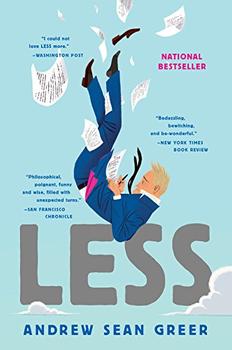Summary | Excerpt | Reading Guide | Reviews | Beyond the Book | Read-Alikes | Genres & Themes | Author Bio

This article relates to Less
With his portrait of Arthur Less, a lovable — if somewhat hapless — man on a trip round the world, Andrew Sean Greer gives more than a nod to Mark Twain's 1869 satire, The Innocents Abroad. Less, a middle-aged gay man, needs to radically re-write his own novel about "a middle-aged gay man walking about San Francisco." This self-conscious reflection on the concept of a gay character prompted me to recall some of the diverse LGBT characters I have known and loved over the years.
Stephen Gordon is the hero of Radclyffe Hall's classic, The Well of Loneliness (1928). This story of an upper class girl who realizes from an early age that she is attracted to women was banned in Britain after an obscenity trial. Stephen, given a boy's name because her parents expected her to be a boy, grows up and becomes a writer. She finds a more liberal society in pre-First World War Paris but falls in love when she is back in London during the War, with fellow ambulance driver, Mary Llewellyn. The path of love for the two women, however, runs far from smoothly.
A contemporary of Radclyffe Hall, Virginia Woolf, wrote ten novels many of which continue to be studied for their feminist and lesbian themes. One of the most famous, Orlando: A Biography (1928), tells the life story of its eponymous hero who is born a man in Elizabethan England but as an adult falls asleep and wakes up as a woman. Woolf plays with her character's sex, sexuality and age as Orlando lives on through the 18th and 19th centuries, ultimately publishing a novel, as Woolf did, in 1928.
Sebastian Flyte is a much-loved central character in Evelyn Waugh's 1945 novel, Brideshead Revisited. Brideshead is the ancestral home of the Flyte siblings Julia and Sebastian. Charles Ryder meets and falls under the spell of Sebastian at University in Oxford but gradually his love for the whole aristocratic family takes over and he also becomes Julia's lover.
During the 1970s and 80s, Armistead Maupin's Tales of the City series of novels, brought to life Michael Tolliver, the kind and generous gay character in the well-loved sequence of ground-breaking stories set in San Francisco. Charting modern day events, including the AIDS epidemic, the series follows multiple characters, including Michael and his transgender landlady, Anna Madrigal.
"Brokeback Mountain," a 1997 short story by Annie Proulx was famously adapted into a movie in 2005. It tells the story of two men, Ennis del Mar and Jack Twist, who have an intense emotional and sexual relationship, but, given the expectations of rural society in the 1960s, they refuse to see themselves as homosexual and go on to marry and have children, although still reuniting numerous times across the next two decades.
 Since her debut, Tipping the Velvet (1998), all Sarah Waters's novels, with the exception of The Little Stranger (2009) have included lesbian characters and relationships. In Fingersmith (2002), Su Tinder sets out to be an accomplice in a plot to seduce a wealthy heiress, Maud Lilly. An affair blossoms between the two young women but both are caught up in the lies and machinations of Maud's uncle and the man they call "Gentleman," Richard Rivers.
Since her debut, Tipping the Velvet (1998), all Sarah Waters's novels, with the exception of The Little Stranger (2009) have included lesbian characters and relationships. In Fingersmith (2002), Su Tinder sets out to be an accomplice in a plot to seduce a wealthy heiress, Maud Lilly. An affair blossoms between the two young women but both are caught up in the lies and machinations of Maud's uncle and the man they call "Gentleman," Richard Rivers.
This is a list that could run on and on. There is Francis Abernethy in The Secret History (1992) by Donna Tartt; Lisbeth Salander in Steig Larsson's Millennium Trilogy; Kay Scarpetta in Patricia Cornwell's long-running crime series, Patrick in The Perks of Being a Wallflower (1999) by Stephen Chbosky and Lestat in Anne Rice's memorable vampire series.
And then there is Albus Dumbledore, famed headmaster of Hogwarts. Although Dumbledore's sexuality was not of relevance to the Harry Potter series, J.K. Rowling has confirmed that the character is gay and it is rumored that this might be an aspect explored in the sequel to the movie, Fantastic Beasts and Where to Find Them.
Filed under Reading Lists
![]() This "beyond the book article" relates to Less. It originally ran in September 2017 and has been updated for the
May 2018 paperback edition.
Go to magazine.
This "beyond the book article" relates to Less. It originally ran in September 2017 and has been updated for the
May 2018 paperback edition.
Go to magazine.
Your guide toexceptional books
BookBrowse seeks out and recommends the best in contemporary fiction and nonfiction—books that not only engage and entertain but also deepen our understanding of ourselves and the world around us.